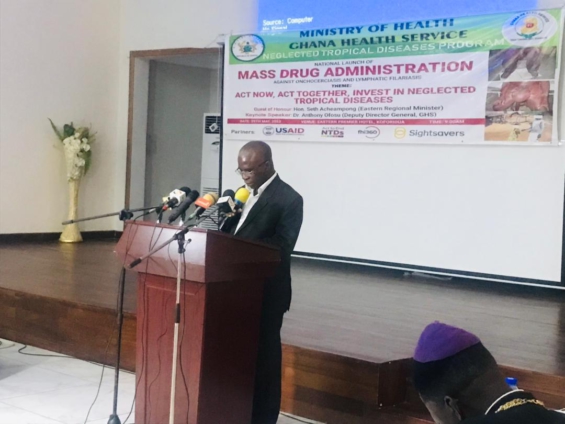The Ghana Health Service (GHS) has initiated mass drug administration against Neglected Tropical Diseases (NTDs), with the goal of administering drugs in endemic districts.
The Mass Drug Administration (MDA) is a measure towards the eradication of NTDs by 2030, specifically onchocerciasis and lymphatic filariasis (LF).
The MDA exercise would take place in 76 onco-endemic districts with a target population of approximately 5.4 million individuals and seven Lymphatic Filariasis-endemic districts with a target population of approximately 400,000 individuals.
During the 2023 national launch in Koforidua, Dr Anthony Adofo Ofosu, Deputy Director-General of GHS, said in 2022, the GHS NTD Programme, with the support of stakeholders, achieved 83.8 percent treatment coverage for lymphatic filariasis, and 84.2 percent and 83.4 percent treatment coverage for onchocerciasis in the first and second treatment rounds, respectively.
He said onchocerciasis, also known as river blindness, and lymphatic filariasis, also known as elephantiasis, can be treated with a highly effective integrated community treatment approach utilising drugs that have been shown to be safe and effective and can be administered by trained non-health personnel.
He said preventing and controlling NTDs was essential to ending acute poverty within the next two decades.
"This approach, MDA, gives a single dose of medication once or twice a year to everyone who qualifies," he said.
"When MDA is used for three to seven years, the burden of NTDs can be greatly reduced and, in some cases, completely eliminated."
Director of Administration at the Eastern Regional Coordinating Council, Madam Stella Panwum who spoke on behalf of Mr. Seth Acheampong, the Eastern Regional Minister, said mass drug administration, morbidity control and management and health education in endemic districts have yielded positive results, and that additional action was required to end the transmission of NTDs by 2030.
She said in a few months, the national programme will also examine schistosomiasis (Bilharzia) and intestinal worm infestation among school-age children.
Madam Panwum said due to the use of placid water for vegetable cultivation and as children swim in riverbeds the region was highly conducive to the transmission of NTDs.
She said the Kwahu Afram Plains North, Kwahu Afram Plains South, and Kwahu East districts would be targeted as endemic districts.
According to Dr. Felicia Owusu Antwi, a WHO representative, mass medication administration is the most recommended strategy for halting the spread of NTDs related to chemotherapy and must be supported to demonstrate the intended effect.
WHO has provided support for onchocerciasis and other NTDs related to chemotherapy throughout Africa, particularly in Ghana.
She said as part of efforts to accelerate the eradication of NTDs, "This support has primarily consisted of financial and operational assistance such as mapping the disease burden, delivery of medicines, and supply chain management to countries including Ghana."
To enhance the content of MDAs, she suggested that the use of technology in data acquisition should be bolstered.
She said the communities must be equipped with pertinent health information so that they can take the necessary measures towards behaviour modification.
Project Director of USAID's Act to End NTDs-West Programme, Mrs. Irene Dzathor said 108 out of 116 endemic districts for lymphatic filariasis and onchocerciasis in Ghana have accomplished a remarkable interruption of transmission.
She said MDA transmission assessments are being conducted in 61 out of 137 endemic districts.
Mrs. Dzathor said the Act to End-WEST Programme is dedicated to assisting the Ghana Health Service.
She said, "We are willing to provide financial support and technical assistance so that by 2030, onchocerciasis and Lymphatic Filariasis are no longer public health concerns in Ghana."
"The USAID Act to End NTDs—West Programme will continue to support Ghana government and other stakeholders in ensuring that all populations at risk for NTDs, particularly onchocerciasis, lymphatic filariasis, and other chemotherapy-related NTDs, have access to preventive treatment therapy," she said.
Latest Stories
-
Mahama vows to create an agro-processing zone in Afram Plains
10 mins -
Political parties should plan for losses, not just wins – IGP advises
12 mins -
524 Diasporan Africans granted Ghanaian citizenship in ceremony
13 mins -
Mahama urges Afram Plains North residents to avoid ‘skirt and blouse’ voting
15 mins -
Asantehene receives more 19th century gold ornament and regalia
22 mins -
Hohoe Ghana Blind Union organises training for members ahead of Election 2024
29 mins -
Alan Kyerematen reveals his future plans for Ghanaian Health professionals
29 mins -
AAIN empowers women and small enterprises in Upper East Region through SHINE project
31 mins -
Akufo-Addo leads nationwide commissioning of 80 educational projects
37 mins -
Ghana and Seychelles strengthen bilateral ties with focus on key sectors
1 hour -
National Elections Security Taskforce meets political party heads ahead of December elections
1 hour -
Samsung’s AI-powered innovations honored by Consumer Technology Association
2 hours -
Fugitive Zambian MP arrested in Zimbabwe – minister
2 hours -
Town council in Canada at standstill over refusal to take King’s oath
2 hours -
Trump picks Pam Bondi as attorney general after Matt Gaetz withdraws
2 hours

